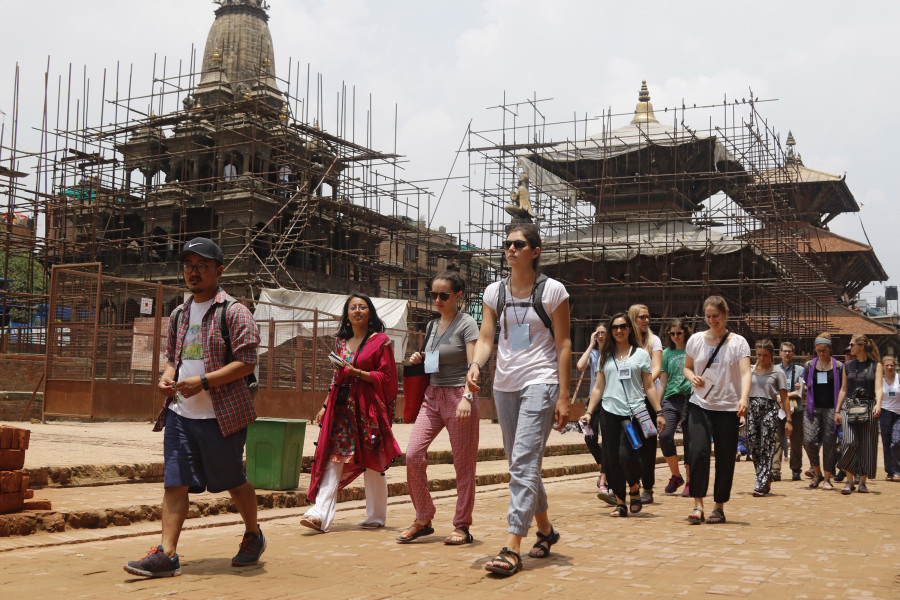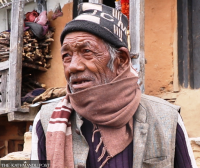National
An irrational fear of the Chinese is causing tourists from other countries to stay away, hoteliers say
Although Chinese tourist numbers have dropped sharply since the coronavirus outbreak, a fear among other visitors is leading hotel occupancy rates to plummet.
Sangam Prasain
“There is fear everywhere. If we host Chinese tourists, others won’t come,” said Suman Ghimire, proprietor of the Jungle Safari Lodge in Sauraha.
Nepal usually receives more than 16,000 Chinese visitors in February, but that number has plunged by over 90 percent this year, said tourism entrepreneurs. Now, a fear of the few Chinese who visit is causing other tourists to stay away.
Nepal’s popular tourism hubs—Pokhara and Chitwan—are facing the brunt of the tourism slump as millions of dollars are expected to be wiped from the market due to the collapse in Chinese arrivals since the outbreak of the coronavirus.
“Hotel occupancy in Chitwan has almost collapsed,” said Ghimire, who is also the president of the Hotel Association of Nepal’s Chitwan chapter. “We had never imagined 15 percent occupancy in the month of February, but it’s become a reality. If we don’t find an alternate market immediately, the consequences will be much bigger.”
Ever since the outbreak, which began in Wuhan, fewer Chinese are flying out as the Chinese government has asked travel companies to put all outbound tours on hold. Several countries have banned all travellers from China over the coronavirus, but Nepal is not one of them. Even now, seven or eight flights arrive weekly from China, down from a peak of 48 every week.
Chinese visitors continue to arrive on these flights; their numbers have dropped, but they are scaring away other tourists, say hoteliers.
“Foreign tourist arrivals in Pokhara have dried up. Hotels are at 10-15 percent occupancy right now,” said Bharat Raj Parajuli, former president of the Western Regional Hotel Association. “Things are not looking good.”
As a member of the hospitality industry, they should not doubt their guests, said Parajuli but an irrational fear appears to have taken over other guests, he said.
“This kind of fear is bigger in Indian tourists as arrivals from the southern neighbour have almost dried out now,” said Parajuli. “To be honest, even I am afraid when I have to deal with Chinese tourists but I know that it’s an irrational fear.”
Chinese tourists are believed to have saved Nepali tourism when the European markets slowed down following the eurozone crisis of 2011. The Visit Nepal 2020 campaign aims to draw 2 million tourists—at least 350,000 from the northern neighbour. In order to promote Nepal as a holiday destination in China, Nepal has been providing ‘free visas’ for Chinese tourists since January 2016.
Pokhara and Chitwan receive the highest number of travellers from China during the January-March period filling almost 60 percent of their rooms.
The tourism industry is seeing an adverse impact from the epidemic even though Nepal only had one confirmed case of the coronavirus and that too has already been cured, said Binayak Shah, senior vice-president of the Hotel Association of Nepal.
“We are at a crossroads. At this time of crisis, the government has to speak. We need to immediately find alternative markets and conduct promotions in the Middle East as this trend may continue for the next two months,” said Shah. “The Tourism Ministry had formed a committee to recommend measures to revive the industry but we have yet to hear contingency plans, particularly to save the grace of the Visit Nepal campaign.”
Travel and trekking agencies, tour guides, restaurants, and transport and retail sector are all feeling the pain as the Chinese—the world's biggest travellers—stay at home amid a global health crisis.
As the death toll increased and more countries cut off China, Nepal’s communist government has not announced any plans to restrict Chinese arrivals to Nepal. However, Chinese arrivals have been stopped at Rasuwagadhi on the border, due to the lack of infrastructure to test and quarantine visitors.
“Chinese planes are occupied by just four or five passengers but they have not been stopped by the Nepal government. We don’t know why the government is being so soft towards its neighbour,” said a hotelier who spoke on condition of anonymity as he feared retribution from the government. “If the Chinese movement is stopped, it will at least give confidence to Indian and Bangladeshi tourists to visit Nepal. At this time, [having] fewer Chinese is a good thing for Nepal.”
In all, more than 69,268 people have been infected and at least 1,670 have died worldwide, according to channelnewsasia.com, which has been providing real-time information on the global epidemic.
Frantic entrepreneurs in Chitwan are planning to launch a “Ghumaun Sauraha” [Let's visit Sauraha] campaign with discounts galore to draw tourists. Rooms may be had at prices as low as $10 a night, according to industry insiders. Nepalis travellers too can cash in on such offers.




 9.12°C Kathmandu
9.12°C Kathmandu













